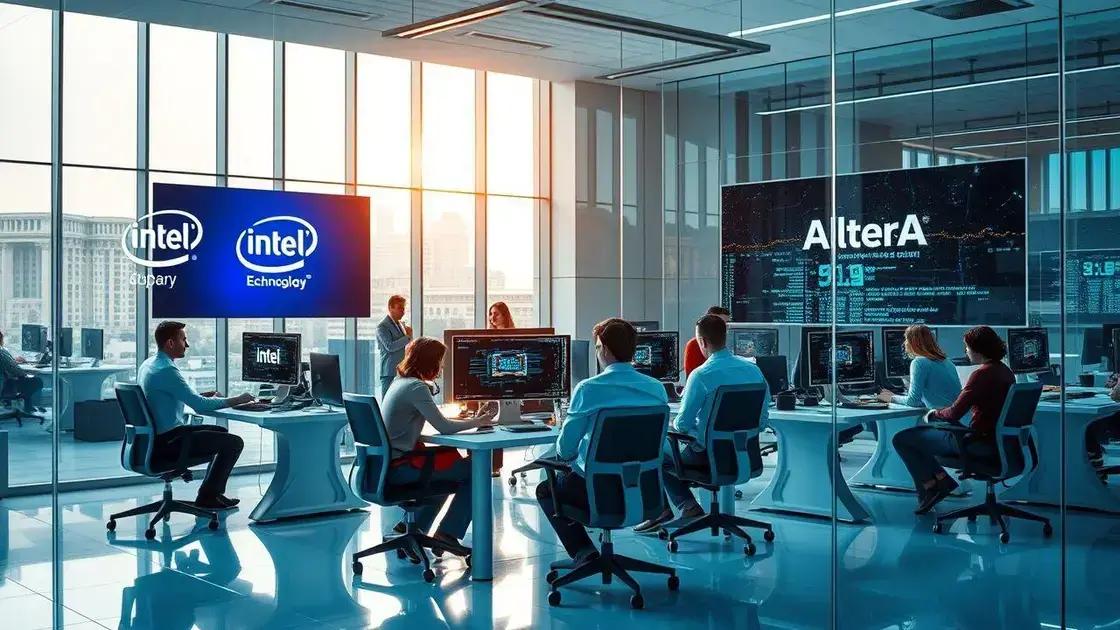Intel sells majority share in Altera business division

Intel sells its majority share in Altera, allowing the company to focus on innovation and core technologies while creating new opportunities for Altera under fresh ownership in the semiconductor market.
Intel sells majority share in Altera business division marks a significant change in the tech landscape. This decision not only impacts Intel’s future but also poses questions about innovation and competition in the semiconductor industry. Curious how this unfolds? Let’s dive deeper.
Background of Intel and Altera
Understanding the background of Intel and Altera is crucial for grasping the recent developments in the tech industry. Both companies have rich histories that reflect their innovations in technology.
Intel, founded in 1968, has been a pioneer in semiconductors, leading the market with advancements in computing technology. Altera, established in 1983, revolutionized FPGAs (Field Programmable Gate Arrays) and became a key player in the industry.
Intel’s Journey
Throughout its history, Intel has introduced several breakthrough products. The company is best known for its microprocessors, which form the backbone of modern computing devices. With continuous innovation, Intel has maintained its leading position in the semiconductor market.
Altera’s Impact
On the other hand, Altera focused on creating customizable hardware solutions, enabling engineers to design products that meet specific needs. Their FPGAs are widely used in various applications, from telecommunications to automotive systems.
- Altera’s technology allows for rapid prototyping.
- FPGAs offer flexibility in design and application.
- Intel aimed to integrate Altera’s capabilities into its product lineup.
In recent years, the collaboration between Intel and Altera has grown. As Intel seeks to diversify its offerings, Altera’s expertise plays a vital role.
The decision for Intel to sell its majority share of Altera signifies a new direction for both companies. Understanding their background helps comprehend the implications of this sale.
Impact of the sale on the tech industry

The impact of the sale on the tech industry is significant, affecting various sectors and companies. This move not only reshapes Intel’s trajectory but also influences the wider technology landscape.
When Intel sells its majority share in Altera, it sends ripples across the semiconductor market. Other companies are likely to react to such a major shift, leading to new partnerships and competition dynamics.
Market Reactions
Market analysts predict that this sale will lead to a realignment of competitive forces. Companies like AMD and Nvidia may find opportunities to expand their market share as Intel refocuses its resources. With Altera’s technology no longer under Intel’s control, rivals could leverage weaknesses in Intel’s offerings.
Innovation Opportunities
Additionally, the sale may create more opportunities for innovation. Other tech companies could develop new products using Altera’s previously proprietary technology, leading to increased competition and better solutions for consumers.
- Emergence of new players in the semiconductor field.
- Increased investment in R&D by competitors.
- Potential for lower prices due to competitive pressure.
Moreover, the focus on Altera’s FPGAs could incite other companies to enhance their FPGA offerings, further accelerating technological advancements. This transition also raises questions about the long-term strategies of both Intel and Altera.
In conclusion, the implications of this sale go beyond just the two companies involved. The entire tech industry will feel the effects, prompting shifts in innovation, competition, and market positions.
What this means for Intel’s strategy
Understanding what this means for Intel’s strategy is critical as the company navigates this new chapter. The sale of the majority share in Altera is a strategic move that reflects broader market trends.
Intel’s strategy has traditionally focused on being at the forefront of semiconductor technology. By parting with Altera, Intel is likely to reallocate resources to enhance its core microprocessor business. This could lead to advancements in performance and efficiency, meeting the growing demands of consumers.
Refocusing on Core Technologies
Intel’s decision indicates a commitment to its primary strengths. The company aims to dominate the CPU market while exploring new technologies like artificial intelligence and machine learning. This shift could result in:
- Increased investment in CPU research and development.
- Enhanced partnerships with AI and tech companies.
- Opportunities to lead in next-gen computing.
Furthermore, Intel enjoys a strong brand presence, which it can leverage to invest in emerging technologies. This strategic refinement allows the company to remain competitive against rivals.
Challenges Ahead
However, challenges lie ahead for Intel as the semiconductor market evolves. Competition is fierce, with companies like AMD and Nvidia continuing to innovate. The sale of Altera opens avenues for these competitors to enhance their offerings. This landscape necessitates continuous adaptation and a clear strategy from Intel.
The company will need to closely monitor industry trends and consumer needs, adjusting its strategies accordingly. By doing so, Intel can position itself as a leader in the evolving tech ecosystem, ensuring sustainable growth.
Future outlook for Altera under new ownership

The future outlook for Altera under new ownership brings both challenges and opportunities. After Intel’s decision to sell its majority share, Altera is poised to enter a new phase that could reshape its direction in the tech industry.
With new ownership, Altera may focus on expanding its product offerings and enhancing its technology. This could lead to innovative solutions in the field of FPGAs. The new leadership likely brings fresh perspectives that can drive the company toward its next growth trajectory.
Innovation and Development
One area where Altera can excel is in research and development. New owners typically want to invest in innovation to increase market share. This could mean greater funding for R&D projects, which can lead to groundbreaking technologies and products that meet customer demands.
- Expansion of product lines to include more advanced FPGAs.
- Collaboration with other tech firms for innovative solutions.
- Investment in next-gen technologies like AI and IoT.
Additionally, focusing on customer needs can be a game-changer as well. Listening to feedback and adapting products accordingly can enhance Altera’s market position. Understanding the demands of the automotive, telecommunications, and computing sectors can also allow Altera to tailor its offerings effectively.
Potential Challenges
Nonetheless, Altera will face competition from established players in the market. Companies that have retained innovative momentum will continue to challenge Altera’s growth. The need for strategic planning will be crucial. This includes identifying niche markets and leveraging unique technologies to stand out.
Altera’s path forward will also depend on how well it adapts to changes and responds to market demands. Achieving success will require agility and a commitment to technological excellence. By prioritizing innovation, Altera can build a strong foundation for the future.
The outlook for Altera under new ownership is bright with potential. By refocusing on innovation and development, Altera can take advantage of fresh strategies that align with market demands. While challenges remain, especially from strong competitors, the new leadership can prioritize research and adapt to the evolving tech landscape. This pivot could position Altera as a noteworthy player in the semiconductor industry, driving innovation and creating more tailored solutions for customers. Ultimately, success will depend on how well Altera can harness its strengths and navigate future challenges.
FAQ – Frequently Asked Questions about Altera’s Future and Intel’s Strategy
What does the sale of Altera mean for its future?
The sale signifies a new direction for Altera, focusing on innovation and tailored solutions under new ownership.
How will this change impact Altera’s technology development?
With fresh leadership, Altera may increase investment in research and development, leading to innovative products in the FPGA space.
What challenges will Altera face after the sale?
Altera will face strong competition from established companies in the semiconductor market, requiring effective strategic planning.
How can Altera adapt to customer needs in the future?
By engaging with customers for feedback and understanding market trends, Altera can tailor its offerings to meet specific demands.






